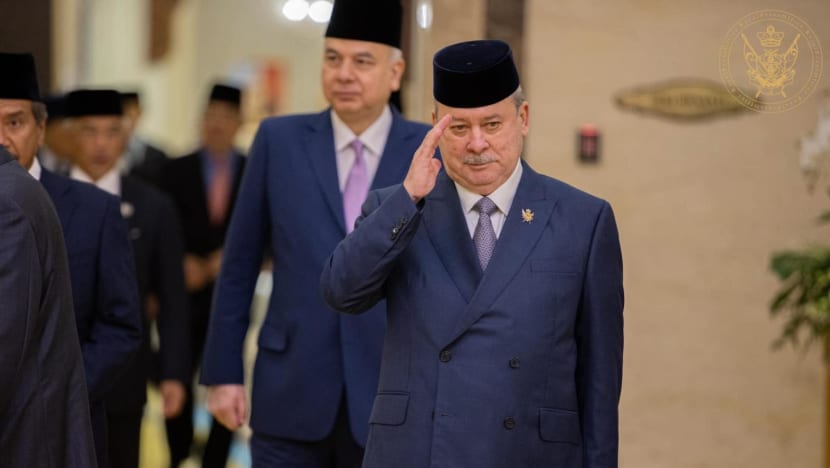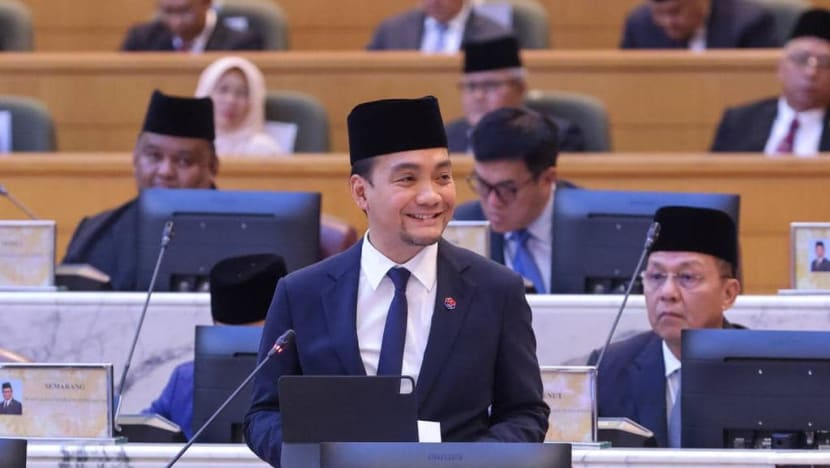Commentary: Malaysia’s new king wants to get more involved, but don’t expect radical changes
Malaysia’s new king, the outspoken Johor sultan, may test the limits of what a monarch can do. But there are established protocols that will be hard to challenge, says James Chin, Asian Studies professor at the University of Tasmania.

Johor ruler Sultan Ibrahim Sultan Iskandar at the national palace. (Photo: Facebook/Sultan Ibrahim Sultan Iskandar)

This audio is generated by an AI tool.
HOBART: Malaysia has a new Agong. Johor ruler Sultan Ibrahim Sultan Iskandar will serve as the country’s new king from Wednesday (Jan 31) for the next five years until 2029 - and there is much anticipation as he comes with a reputation.
In his home state, he is seen as someone who takes a hands-on approach to issues concerning the state. It is public knowledge that no chief minister can be appointed if he is unhappy with the candidate.
After the Barisan Nasional (BN) coalition cruised to victory in the March 2022 Johor state election, the appointment of Onn Hafiz Ghazi as chief minister came as a shock to many. He had not been the choice of the United Malays National Organisation (UMNO) - the party had indicated its preference to keep Hasni Mohammad in his old position - but he was the sultan’s choice.
Sultan Ibrahim is regularly seen with senior bureaucrats who brief him directly on developments in Johor and is known to be outspoken on the issue of Bangsa Johor, or the Johorean identity across ethnicities and backgrounds.
He has said many times that he does not believe in racial politics, and is famous for ordering the Johor religious authority not to cooperate with Jakim, the federal Islamic body.

In sum, the Johor ruler is an outspoken sultan who is willing to express his opinions in public, which in turn will influence the Johor state government.
The question now is: Will he be similarly outspoken now that he is Agong?
NO “PUPPET KING”
Sultan Ibrahim has made it clear he will not be a “puppet king”. But just how far will - or can - he take it in Malaysia’s constitutional monarchy system?
In an interview with The Straits Times on Nov 23, 2023, Sultan Ibrahim said he planned to use his influence to “make things right”, with political stability a priority and corrupt politicians in his crosshairs. One suggestion was for state-owned oil company Petronas and the Malaysian Anti-Corruption Commission (MACC) to report directly to the king, instead of the parliament.
All the above are popular, and no one will disagree with him on the need to tackle corruption and ensure political stability.
Yet the reality is that in the Westminster system inherited from the British, the monarch is “above politics”.
He is kept updated on Cabinet deliberations in confidential pre-Cabinet meetings between the monarch and the sitting prime minister, during which he is free to express views - even political ones - to the prime minister.
The prime minister, in turn, is supposed to take the views of the monarch into account when he goes to the Cabinet or when government policies are made.
Since the deliberations of the monarch and the prime minister are absolutely confidential, the monarch retains its position as “above politics”.
TESTING LIMITS OF CONSTITUTIONAL MONARCHY?
Being above politics also means that whatever happens at the palace must remain confidential. This allows the king to receive visitors, such as members of the opposition, to discuss political issues in total confidence.
An example of this was the five days of a hung parliament after the November 2022 general elections when neither Pakatan Harapan leader Anwar Ibrahim nor Perikatan Nasional leader Muhyiddin Yassin was able to secure sufficient seats to form a government.
During this period, Sultan Ibrahim’s predecessor Sultan Abdullah called all the key political leaders to the palace. When the Agong then asked Mr Anwar to form the government, his decision was accepted by the political class. Until today, no one knows how the discussion went inside the palace.
The Westminster system of constitutional monarchy has worked well in Malaysia and it is unlikely to be changed. The king may try to test the limits, but he will be wary also of challenging the established protocols.
After all, any real changes would have to be agreed by the nine sultans collectively and there is a five-year clock.
MORE DIRECT PUBLIC ENGAGEMENTS EXPECTED
What we can expect from the Johor Sultan is more direct public engagements where he will make his views known.
He will likely weigh in on matters such as the people’s welfare and issues related to government service delivery, as well as push for more developments with a Johor connection. For example, he has publicly stated his view on resuming the high-speed rail (HSR) project between Kuala Lumpur and Singapore and expanding relations with Singapore and China.
In line with his call for political stability, we can also expect the new king to tell the political class to use the floor of parliament rather than the palace if they wish to change government.
It’s unlikely the new king will speak on political matters outright. There are palace protocols to follow, and he is fully aware of them.
Malaysia’s unique system of rotational monarchy has worked well since 1957 and no single individual will be able to change its fundamental characteristics. All Malaysians understand the need to keep the institution “above politics”.
James Chin is Professor of Asian Studies at the University of Tasmania and Senior Fellow at the Jeffrey Cheah Institute on Southeast Asia.


















